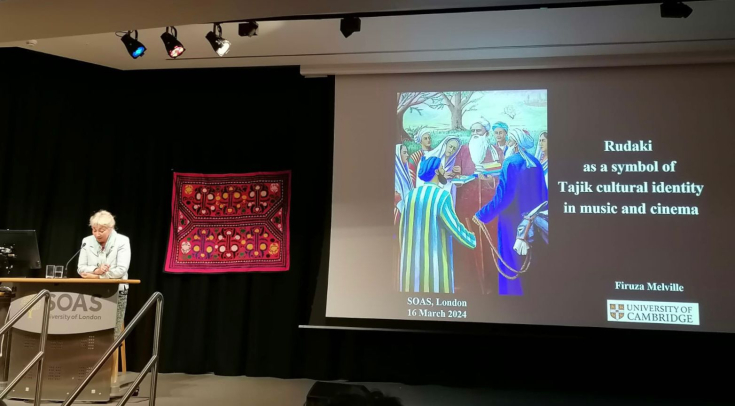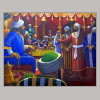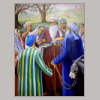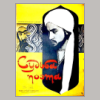Rudaki as a symbol of Tajik and cultural identity in music and cinema
Rudaki as the father of Tajik and Persian verse
This paper by Dr Firuza Melville was a part of the Rudaki Day, organised by the Embassy of the Republic of Tajikistan in London.
In 1958 the first great 1100th anniversary of Rudaki was very widely celebrated, when many events were organised. Among them the monuments were erected, a jubilee coin, a stamp and a medal were issued, and even a film was made, called the ‘Fate of the poet’.
Rudaki is known as both Adam al-Shu‘ara and Malek ash-Shuara as he was the first chief poet at the Samanid court who started to write high quality poetry in his native language after two centuries of silence, two centuries of the Arab linguistic domination.
There are so many mysteries about Rudaki and his legacy - about his blindness, his involvement in the Karmatian movement, the disappearance of his legendary divan, and especially the reasons of his fall and disgrace after such a cosmic career.
Some information could be extracted from his own poetry, for instance his autobiographical elegy shekayat az piri composed at the end of his long and eventful life.
He mentions his exceptional success as a celebrity poet and a musician across the whole empire, his incredibly high honoraria, and a splendid life style. In this elegy he masterfully intertwines bitter lamentations of his lost youth and wealth with pure joy and pride for his poetic and musical legacy. However, the finale is bitterly sad - he is penniless, lonely, old and blind. Nevertheless, he is remembered more than a thousand years after his death as a great singer of life with a magic power of his genius.
In his film about Rudaki of 1959 Bentsion Kimyagarov incorporated into his biography not only very few details we know about his life but other stories from classical Persian literature. For example, Rudaki’s passionate romance with a slave girl Nigina, was borrowed from Attar’s Ilahinameh where a noble girl, Rabi’a, also a poet in her own right- falls in love with her brother’s slave Bektash. According to Attar, it was Rudaki who unknowingly caused Rabi’a death. In the film it is Nigina - Rudaki’s beloved writes her last poem on the wall of the bathhouse with her own blood.
Kimyagarov’s film is a classical Hollywood-style musical, where Rudaki is performing his songs accompanied by a mass chorus of the courtiers, staged by Ghaffor Valamatzadeh, while music was composed by Andrey Babayev.
The key episode of the film is about Rudaki’s extraordinary feat, when he brings back the Amir to Bukhara after four years of absence in Herat. This story was borrowed from a 12th-century collection of historical anecdotes called Chahar maqala by Nizami Aruzi Samarqandi. In this treatise Rudaki is mentioned the first among many other celebrities of his time, like Avicenna, Biruni, and Khayyam.
In Nizami’s story Rudaki composes and performs the most beautiful ode to Bukhara, starting with the bayt: bu-ye ju-ye Muliyan ayad hame. Only 7 verses of this poem produced such an effect on the King that felt such an immediate and strong excitement and languor for Bukhara that he jumped on his horse and rode for miles without even noticing that he didn’t have boots or even trousers. Only 7 bayts of Rudaki did what all desperate attempts of the King’s entourage to bring him home.
Most likely for his performance Rudaki used ushshaq-e Samarqandi, which is the most ancient out of all 12, mentioned by ‘Abd al-Rahman Jami in his treatise on music.
For Rudaki it was a great triumph - he had his original honorarium of 5 000 gold dinars offered by the courtiers, doubled. But what we have from his magical poem is only those 7 verses and a great story of Rudaki’s genius.
Other speakers of the conference were Professor Joanna Newman, provost of SOAS, Professor Qobiljon Khushvaqtzoda, President of the Tajik Academy, Narguess Farzad of SOAS, Dr Dodikhudo Dagiev, Ismaili Institute, Dr Otambek Mastibekov, Dr James White, Oxford University, and Gulsifat Shahidi.
It was opened by the unveiling ceremony of the bust of Rudaki in SOAS and the performances by Nigina Amonqulova and Khurshed Ibrohimov.
Files
Links
BBC PersianGallery



